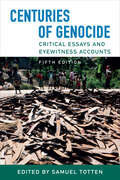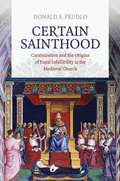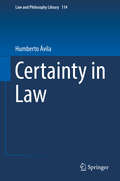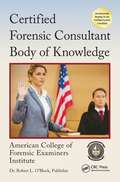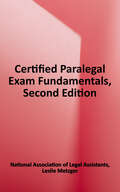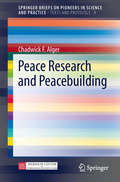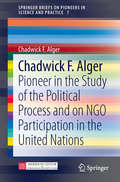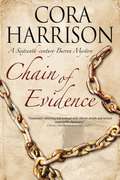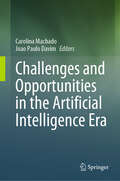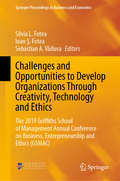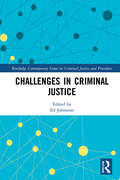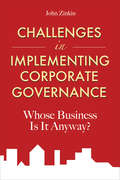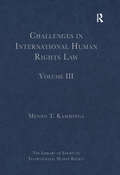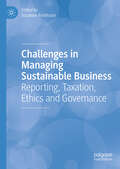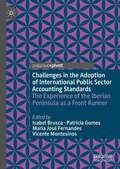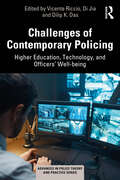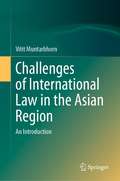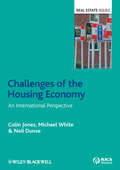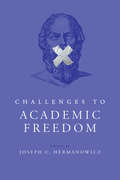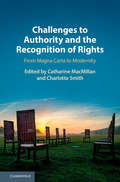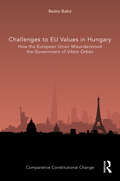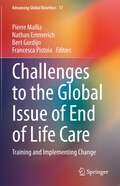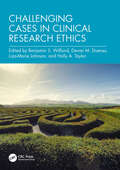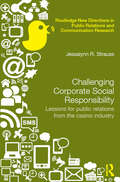- Table View
- List View
Centuries of Genocide: Critical Essays and Eyewitness Accounts, Fifth Edition
by Samuel TottenThe new edition of this market-leading textbook includes a revised introduction and updated chapters with new research and insights. Four new case studies of twenty-first-century genocides bring this horrific history up to the present moment: the genocide perpetrated by the government during Argentina’s "Dirty War," the genocide of the Yazidis by the Islamic State of Iraq and Syria (ISIS), genocidal violence against the Rohingya in Myanmar, and China’s genocide of the Uyghurs. Powerful survivor testimonies bring the essays to life and help readers grapple with the difficult lessons presented throughout the book.
Certain Sainthood: Canonization and the Origins of Papal Infallibility in the Medieval Church
by Donald S. PrudloThe doctrine of papal infallibility is a central tenet of Roman Catholicism, and yet it is frequently misunderstood by Catholics and non-Catholics alike. Much of the present-day theological discussion points to the definition of papal infallibility made at Vatican I in 1870, but the origins of the debate are much older than that. In Certain Sainthood, Donald S. Prudlo traces this history back to the Middle Ages, to a time when Rome was struggling to extend the limits of papal authority over Western Christendom. Indeed, as he shows, the very notion of papal infallibility grew out of debates over the pope's authority to canonize saints.Prudlo's story begins in the twelfth and thirteenth centuries when Rome was increasingly focused on the fight against heresy. Toward this end the papacy enlisted the support of the young mendicant orders, specifically the Dominicans and Franciscans. As Prudlo shows, a key theme in the papacy's battle with heresy was control of canonization: heretical groups not only objected to the canonizing of specific saints, they challenged the concept of sainthood in general. In so doing they attacked the roots of papal authority. Eventually, with mendicant support, the very act of challenging a papally created saint was deemed heresy.Certain Sainthood draws on the insights of a new generation of scholarship that integrates both lived religion and intellectual history into the study of theology and canon law. The result is a work that will fascinate scholars and students of church history as well as a wider public interested in the evolution of one of the world’s most important religious institutions.
Certainty in Law (Law and Philosophy Library #114)
by Humberto ÁvilaInstead of the usualapologetic treatment found in legal doctrine, linked to the determinacy,immutability or predictability of norms, this book treats legal certaintyinnovatively, holistically and in depth. Using a method at once analytical andfunctional, Professor Ávila examines the structural elements of legalcertainty, from its definition and foundations to its various dimensions,normative forces and efficacies, citing a wealth of examples from case law tosupport each of the theses defended. Nosubject is more important and topical than legal certainty. Problems relatingto lack of understanding, instability and unpredictability of law intensify dayby day everywhere, in civil law and common law countries alike. Normativesources are increasingly diverse in origin (national, international, community)and multiple in nature (legal, contractual, jurisprudential). They changeconstantly, and present increasingly frequent problems of ambiguity andvagueness that significantly hinder their comprehension. This state of affairs,which to a greater or lesser extent is true of any legal order, justifies areturn to the subject of legal certainty. In this book, essential questions areanswered such as: Legal certainty in what sense? Certainty of what, for whom,in whose vision and by whom? When, to what extent, and to what end? "(. . . ) it is probably themost comprehensive and systematic study ever produced on this subject using theanalytical method. " (Riccardo Guastini, Professor of Jurisprudence, Universityof Genoa, Italy)
Certified Forensic Consultant Body of Knowledge (Center For National Threat Assessment Ser. #1)
by 0 American College of Forensic Examiners InstituteIn a proper court setting, experts in various fields are often asked to provide testimony and evidence on numerous professional topics. To be able to effectively testify in a courtroom requires knowledge, training, experience, and expertise. The materials presented in Certified Forensic Consultant Body of Knowledge provide the necessary information
Certified Paralegal Exam Fundamentals
by National Association of Legal Assistants (Editor Various Roles"The book addresses general legal principles and broad areas of concern and is not intended to be a source of specific legal advice or solutions to particular problems. Rather, its goal is to provide the reader with an overall understanding of legal concepts associated with the CP Exam. <p><p>The purpose of the book is to assist examinees of NALA’s Certified Paralegal (CP) Exam in their preparation to successfully complete the exam and earn the credential. "
Chadwick F. Alger: Peace Research and Peacebuilding (SpringerBriefs on Pioneers in Science and Practice #9)
by Chadwick F AlgerThis is the third volume to commemorate the 90th birthday of the distinguished scholar Chadwick F. Alger to honor his lifetime achievement in international relations, as President of the International Studies Association (1978-1979) and as Secretary General of the International Peace Research Association (1984-1987). After a brief introduction by Chad F. Alger this volume presents six of his key texts on Peace Research and Peacebuilding, covering "The quest for peace: What are we learning?"; "The Emerging Toolchest for Peacebuilders"; "Peace Studies as a Transdisciplinary Project"; "Challenges for Peace Researchers and Peace Builders in the Twenty-First Century: Education and Coordination of a Diversity of Actors in Applying What We Are Learning"; "The escalating peace potential of global governance", "There Are Peacebuilding Tasks for Everybody", and "What Should Be the Foundations of Peace Education?"
Chadwick F. Alger: Pioneer in the Study of the Political Process and on NGO Participation in the United Nations (SpringerBriefs on Pioneers in Science and Practice #7)
by Chadwick F AlgerThis volume honors the lifetime achievements of distinguished scholar Chadwick F. Alger on the occasion of his 90th birthday. Carolyn Stephenson presents Prof. Alger as a Pioneer in the Study of the Political Process and on NGO Participation in the United Nations. Part 1 offers an autobiographical note and a comprehensive bibliography of his academic publications. Part II includes three texts on "The Political Process in the UN," namely "The Researcher in the United Nations: Evolution of a Research Strategy," "Interaction in a Committee of the United Nations General Assembly" and "Interaction and Negotiation in a Committee of the UN GA." In Part III, which focuses on "Civil Society Organizations in the UN System (NGOs)," three chapters deal with "Evolving Roles of NGOs in Member State Decision-making in the UN System," "The Roles of NGOs in the UN System: From Article 71 to a People's Millennium Assembly" and "Strengthening relations between NGOs and the UN system: Towards a research agenda."
Chain of Evidence: A Mystery of Medieval Ireland (Burren Mysteries #9)
by Cora Harrison"Harrison, like Peter Tremayne in his Sister Fidelma series, provides a superior brand of historical mystery" -Booklist. When clan leader Garrett MacNamara's dead body is found on the road after a herd of cows has escaped, what was initially assumed to be a tragic case of him being squashed to a pulp by livestock becomes more sinister when a local claims they saw a chain attached to the mutilated body--which has now disappeared. Mara and her scholars must now investigate: was Slaney, Garrett's wife, threatened by two new arrivals, or is she being blamed for his murder to clear the way for a new leader . . .
Challenges and Opportunities in the Artificial Intelligence Era
by Carolina Machado Joao Paulo DavimThis book contributes to a better understanding of the impacts that artificial intelligence (AI) has on organizations and how they reinforce opportunities while simultaneously overcoming the underlying risks. The importance of artificial intelligence in business innovation lies in AI's ability to drive efficient automation, provide strategic insights through advanced data analysis and catalyse the development of personalized products and services, resulting in more effective operations and agile responses to market demands. This book will be read by academics, researchers, managers, engineers, practitioners, and other professionals in different sectors of business and management.
Challenges and Opportunities to Develop Organizations Through Creativity, Technology and Ethics: The 2019 Griffiths School of Management Annual Conference on Business, Entrepreneurship and Ethics (GSMAC) (Springer Proceedings in Business and Economics)
by Ioan Ş. Fotea Sebastian A. Văduva Silvia L. FoteaThis proceedings volume provides a multifaceted perspective on current challenges and opportunities that organizations face in their efforts to develop and grow in an ever more complex environment. Featuring selected contributions from the 2019 Griffiths School of Management Annual Conference (GSMAC) on Business, Entrepreneurship and Ethics, this book focuses on the role of creativity, technology and ethics in facilitating the transformation organizations need in order to be ready for the future and succeed.Growth and development have always been imperative for people, organizations, and societies and a relevant topic in the management sciences. Globalization, along with dramatic changes in social, cultural, and technological progress, are the main factors that determine the current conditions for development, putting forth a new set of challenges and opportunities that are putting pressure on organisations to adapt. Although technology and creativity seem to be the mantra for success in this new context, issues around the ethics of these two factors also seem to be crucial to the sustainability of growth in organizations.Featuring contributions on topics such as academic marketing, technology in healthcare organizations, ethical issues in hospitality, artificial intelligence and data mining, this book provides research and tools for students, professors, practitioners and policy makers in the fields of business, management, public administration and sociology.
Challenges in Criminal Justice (Routledge Contemporary Issues in Criminal Justice and Procedure)
by Ed JohnstonThis collection examines contemporary challenges to the criminal justice system in England and Wales. The chapters, written by established academics, rising stars and practising lawyers, seek not only to highlight these challenges but to offer solutions. The book examines issues with legal assistance in the police station, concerns relating to juror decision making and problems in and presented by both virtual hearings and the advent of the Single Justice Procedure Notice. The work also examines challenges surrounding vulnerability in the criminal justice system. Here, diversity includes vulnerability in the criminal trial, neurodivergence as well as issues with diversity and marginalisation in the criminal justice system as a whole. The book also discusses matters centred around sexual offending – including the attrition rate in rape cases as well as the recent development of ‘vigilante’ paedophile hunters and their acceptance as a viable limb of the criminal justice system. Finally, the volume looks at the post-conviction stage and examines recent prison policy through the lens of the human rights of the prisoner. The closing chapter examines the independence of the Criminal Cases Review Commission and highlights how recent changes have undermined this. While focused on England and Wales, the topics discussed are of wider international significance and will be of interest to students, academics and policy-makers.
Challenges in Implementing Corporate Governance: Whose Business is it Anyway?
by John Zinkin"John Zinkin's new book on Challenges in Implementing Corporate Governance is a welcome addition for board members and senior management on how to improve corporate governance in the post-crisis period. John correctly identifies that most boards on underperforming companies have three elements of failure: a lack of proper understanding of the business and its strategy; a total lack of appreciation of both the strategic and systemic risks created by new product markets; and a total failure by boards to ensure that the incentive structures for top management reflect long-term needs rather than short-term profits, thereby putting the company's future at risk. John has written a useful and practical handbook that is a must read for all board members on how to improve corporate governance."—Datuk Seri Panglima Andrew Sheng, Chief Adviser, China Banking Regulatory Commission and the Boards of the Qatar Financial Centre Regulatory Authority , Sime Darby Berhad and Khazanah Nasional "This timely book will interest those wanting to improve corporate governance and risk management. It should also appeal to anyone curious about what caused banks to fail in a number of markets in recent times, and the values which led to this failure. In considering principles which are essential to good governance, ACCA recognizes that corporate governance evolves and improves over time. We accept that organizations in different sectors and across the world operate in diverse environments in terms of culture, regulation, legislation and enforcement. What is appropriate, in terms of governance, for one type of organization will not be appropriate to all organizations. John Zinkin’s book seeks to address this challenge, analyzing the essential cultural and behavioral issues which sit at the heart of the challenges."—Paul Moxey, Head of Risk Management and Corporate Governance, Association of Chartered Certified Accountants "A scholarly combination of practical guidelines and strategic vision."—Lady Sylvia Jay CBE, Vice-Chairman, L'Oreal UK; Independent Director, Alcatel-Lucent, Compagnie de Saint Gobain, Lazard Limited and Carrefour "This is a highly topical and timely publication. Globally, the crisis that has gripped the financial services sector following the failure of well known global banks in recent years has focused attention on corporate governance. To restore confidence in the financial services sector is a long-term goal and effective corporate governance, together with the closely associated topic of risk management, has gripped not only governments and banks, but the public too. In this book, John Zinkin clearly asserts that financial institutions need to exert their responsibilities beyond their shareholders and far more into the wider group of stakeholders, including employees and wider society. In considering issues globally, John provides a book that is not only thought-provoking but pragmatic and useful at a time when stakeholders in our banks need to see real change in transparent, practical ways from those charged with governing our banks."—Ruth Martin, Managing Director, The Chartered Institute of Securities and Investment
Challenges in International Human Rights Law: Volume III
by Kamminga Menno T.The main challenges within international human rights law are generally thought to be in the fields of transitional justice, non-state actors, terrorism, development, poverty and environmental degradation. This volume of articles not only covers these mainstream challenges but also a wider and more systematic range, including justiciability of social and economic rights, extraterritoriality, health care and investment arbitration. The key literature selected for this collection includes articles that have appeared in mainstream journals and books from leading publishers as well as papers that have appeared in lesser known journals, hard to find books and UN documents. Some of these are classic essays whilst others are more recent additions that reflect the current state of the debate. The papers are put into context by a specially commissioned introduction by the volume editor. This volume is an invaluable resource for human rights lawyers in search of the key literature in fields outside their own specialization as well as for students, researchers and lecturers seeking an overview of the challenges in human rights law.
Challenges in Managing Sustainable Business: Reporting, Taxation, Ethics and Governance
by Susanne ArvidssonOver the past 30 years sustainability has become increasingly important to scholarly research and business in practice. This book explores a variety of challenges faced by businesses when becoming sustainable and how this links to economic development and its corruption, ethical and taxation implications. Showcasing an interdisciplinary approach, the chapters explore topics such as business ethics, corporate responsibility, tax governance and sustainability practice.
Challenges in the Adoption of International Public Sector Accounting Standards: The Experience of the Iberian Peninsula as a Front Runner (Public Sector Financial Management)
by Vicente Montesinos Isabel Brusca Patrícia Gomes Maria José FernandesThe aim of this book is to take stock of the experiences of Spain and Portugal in the adaptation to the IPSAS, showing the advantages, disadvantages and the main challenges for its implementation. In chapter one, the book analyses the IPSAS and the conceptual framework, as well as the claimed benefits and criticisms of IPSAS. Chapter two makes an analysis of the diffusion of the IPSAS in the international framework and the process of harmonization in development in Europe. Chapter three and four analyze the process of adaptation to IPSAS in Portugal and Spain respectively. In the chapter five, there is a comparative analysis between Spain and Portugal, and the last chapter present the main conclusions. This book can help to understand the level of implementation of the reforms and how governments are applying the IPSAS.
Challenges of Contemporary Policing: Higher Education, Technology, and Officers’ Well-Being (Advances in Police Theory and Practice)
by Vicente RiccioThis edited collection reflects contemporary challenges faced by police forces across the globe and the role of technology in addressing them. The use of science and technology raises questions about ethics, training, the well-being of people, and freedom. New technologies promise to foster police practices based on intelligence, accuracy, and preparedness, and are considered necessary to overcome challenges such as declining budgets, lack of personnel, and legitimacy. However, technologies can also be used for authoritarian and nefarious purposes. For those reasons, this book aims to discuss related topics from various contexts to establish connections among common problems in the field of policing across the globe. This book provides an internationally relevant assessment of the use of technology in the field of policing, as well as the impact on training and police well-being. It is ideal for an academic audience at both graduate and undergraduate levels in the fields of criminal justice studies, police studies, legal sociology, and public policy, and will be of interest to police practitioners, legal professionals, social service workers, and public-sector managers.
Challenges of International Law in the Asian Region: An Introduction
by Vitit MuntarbhornThis book provides an innovative outlook of the various challenges of international law in the Asian region. Moving away from the Eurocentrism prevalent in the literature on the subject, it provides a comprehensive Asian perspective without adopting a monolithic or homogeneous Asian approach. Although Asian countries converge on certain issues related to international law, such as engagement with the United Nations, at times, there is a significant divergence, such as in the case of agricultural trade liberalisation. Given the vastness of the region and the differing political systems, there are many discrepancies to consider. The book takes into account the viewpoint of civil society so as to avoid a vertical state‐centred approach. Offering an easy-to-understand presentation of key issues concerning the region, this book is a useful introduction to this complex topic for students, academics and practitioners of international law.
Challenges of the Housing Economy: An International Perspective (Real Estate Issues #60)
by Michael White Colin Jones Neil DunseThis timely book addresses key challenges faced by policy makers and the house-building industry in a post-credit crunch world. It examines the implications for households, the housing market, the economy, as well as for government's policy choices. Challenges of the Housing Economy: an international perspective brings together experts from around the world to examine recent housing market trends. The contributions reveal common long-term trends in housing markets worldwide. Despite differences in supply conditions and the role of planning, there is a trend toward rising house prices that has created significant barriers to home ownership for young households while increasing the wealth of older generations. The financial crisis had a differential impact on housing markets but in many countries where mortgage finance became severely constrained, house prices fell and there was a dramatic fall in housing construction. The falls in house prices in these countries have ostensibly improved affordability but the housing markets have been dominated by the lowering of loan to values applicable to new mortgages which has further raised the hurdles to potential first-time purchasers. At the same time as young households are increasingly rationed out of owner-occupation, public sector expenditure cut-backs in many countries result in limited new social housing. Instead, value for money imperatives will mean new funding models for affordable housing that require greater use of public-private partnerships. The private rented sector could potentially meet the demand for the new generation of long-term renters. However, there are doubts - in the UK at least - that this sector will be able to expand significantly or provide an appropriate type and standard of housing. This is an essential advanced text for students and researchers of land economy and land management; property and real estate; housing policy; and urban studies.
Challenges to Academic Freedom
by Joseph C. HermanowiczA must-read collection on contemporary threats to academic freedom.Academic freedom may be threatened like never before. Yet confusion endures about what professors have a defensible right to say or publish, particularly in extramural forums like social media. At least one source of the confusion in the United States is the way in which academic freedom is often intertwined with a constitutional freedom of speech. Though related, the freedoms are distinct.In Challenges to Academic Freedom, Joseph C. Hermanowicz argues that, contrary to many historical views, academic freedom is not static. Rather, we may view academic freedom as a set of relational practices that change over time and place. Bringing together scholars from a wide range of fields, this volume examines the current conditions, as well as recent developments, of academic freedom in the United States. • the sources of recurring threat to academic freedom; • administrative interference and overreach; • the effects of administrative law on academic work, carried out under the auspices of Title IX legislation, diversity and inclusion offices, research misconduct tribunals, and institutional review boards; • the tenuous tie between academic freedom and the law, and what to do about it; • the highly contested arena of extramural speech and social media; and• academic freedom in a contingent academy.Adopting varied epistemological bases to engage their subject matter, the contributors demonstrate perspectives that are, by turn, case study analyses, historical, legal-analytic, formal-empirical, and policy oriented. Traversing such conceptual range, Challenges to Academic Freedom demonstrates the imperative of academic freedom to producing outstanding scholarly work amid the concept's entanglements in the twenty-first century.Contributors: Patricia A. Adler, Peter Adler, Timothy Reese Cain, Dan Clawson, Joseph C. Hermanowicz, Philip Lee, Gary Rhoades, Laura Stark, John R. Thelin, Hans-Joerg Tiede, Gaye Tuchman, Stephen Turner, Eve Weinbaum
Challenges to Authority and the Recognition of Rights: From Magna Carta to Modernity
by Charlotte Smith Catharine MacMillanWhile challenges to authority are generally perceived as destructive to legal order, this original collection of essays, with Magna Carta at its heart, questions this assumption. In a series of chapters concerned with different forms of challenges to legal authority - over time, geographical place, and subject matters both public and private - this volume demonstrates that challenges to authority which seek the recognition of rights actually change the existing legal order rather than destroying it. The chapters further explore how the myth of Magna Carta emerged and its role in the pre-modern world; how challenges to authority formed the basis of the recognition of rights in particular areas within England; and how challenges to authority resulted in the recognition of particular rights in the United States, Canada, Australia and Germany. This is a uniquely insightful thematic collection which proposes a new view into the processes of legal change.
Challenges to EU Values in Hungary: How the European Union Misunderstood the Government of Viktor Orbán (Comparative Constitutional Change)
by Beáta BakóThe national-conservative government of Hungary has been heavily criticised for its violation of EU values, primarily, the rule of law in recent years. This book looks to the bigger picture in examining the rule-of-law debate between Hungary and the EU. It explores how certain elements of various Hungarian constitutional reforms are interrelated and how the EU has failed to address the situation properly. It is argued here that the reason the EU has been unable to enforce its values effectively in Hungary stems from the misunderstanding that Hungary kept the institutional design of liberal democracy but made it dysfunctional. The debate with the EU is characterised as a dialogue of the deaf as the EU insists on advancing the rule-of-law agenda, while the Hungarian government defends itself by alluding to its democratic legitimacy. The author contents that the Hungarian government is in fact playing a charade, while the actions of the EU maintain this drama. The book will be of interest to students, academics, and policymakers working in the areas of constitutional law and politics, EU law, and populism.
Challenges to the Global Issue of End of Life Care: Training and Implementing Change (Advancing Global Bioethics #17)
by Bert Gordijn Nathan Emmerich Pierre Mallia Francesca PistoiaThis book addresses the problems faced by people and hospitals dedicated to providing optimal end-of-life care and asks whether ethicists can function as experts on this subject. Though ethics consultation is a growing practice in medical contexts, difficult questions surrounding the role of ethicists in professional decision-making remain. The chapters in this book examine the nature and plausibility of moral expertise, the relationship between character and expertise, the nature and limits of moral authority, the question of how one might become a moral expert, and the trustworthiness of moral testimony. This volume not only engages with the growing literature in the debate on end-of-life care but also offers new perspectives from both academics and practitioners. Such perspectives include ways on how to get together to optimize end-of-life care. This book is of particular interest to bioethicists, clinicians, ethics committees, students of social epistemology, patient groups, and institutions, especially religious, who may not be sufficiently imparting the social teachings of end-of-life care. It also shows how they are indeed stakeholders for what is today called ‘a good death’. These new essays advance discussions and provide practical information on dying as well as acting as a guide to those interested in actively effecting change.
Challenging Boardroom Homogeneity
by Aaron A. DhirThe lack of gender parity in the governance of business corporations has ignited a heated global debate, leading policymakers to wrestle with difficult questions that lie at the intersection of market activity and social identity politics. Drawing on semi-structured interviews with corporate board directors in Norway and documentary content analysis of corporate securities filings in the United States, Challenging Boardroom Homogeneity empirically investigates two distinct regulatory models designed to address diversity in the boardroom: quotas and disclosure. The author's study of the Norwegian quota model demonstrates the important role diversity can play in enhancing the quality of corporate governance, while also revealing the challenges diversity mandates pose. His analysis of the US regime shows how a disclosure model has led corporations to establish a vocabulary of 'diversity'. At the same time, the analysis highlights the downsides of affording firms too much discretion in defining that concept. This book deepens ongoing policy conversations and offers new insights into the role law can play in reshaping the gendered dynamics of corporate governance cultures.
Challenging Cases in Clinical Research Ethics
by Holly A. Taylor Liza-Marie Johnson Benjamin S. Wilfond Devan M. DuenasClinical research ethics consultation has emerged in the last 15 years as a service to those involved in the conduct of clinical research who face challenging issues for which more than one course of action may be justified. To respond to a growing field and need for opportunities to share knowledge and experience, the Clinical Research Ethics Consultation Collaborative, established in 2014, holds monthly webinars for its 90 members to present their most challenging cases to each other and engage in substantive discussion. Every year, the group selects the four most interesting cases with accompanying commentaries for publication in the American Journal of Bioethics. This timely book brings together these cases and commentaries under a range of common themes for the first time, creating a permanent collection in book format that encourages and supports readers to gain a better understanding of the ethical challenges that they may face, and providing them with a convenient and reflective resource to reference in their own deliberations. Key Features: • Comprehensive collection of cases and commentaries, chosen to reflect the range of issues faced by clinical researchers and oversight committees and illustrate the diversity of analysis that can arise • Supplemented by short introductions to each section • Focus on ethical rather than regulatory issues • Essential reading for graduate students in bioethics and post-doctoral bioethics fellows, and useful for all participants in training grants that are funded by either NIH or NSF Presenting challenging cases to stimulate reflection, the book provides invaluable guidance to clinicians in training and in practice and to investigators, bioethics consultants, regulators, and oversight bodies.
Challenging Corporate Social Responsibility: Lessons for public relations from the casino industry (Routledge New Directions in PR & Communication Research)
by Jessalynn R. StraussThe concept of Corporate Social Responsibility (CSR) has become increasingly widespread, as businesses seek to incorporate socially responsible behaviors while still being accountable to shareholders. Indeed some research has suggested that CSR in itself can form the basis of good PR by promoting consumers’ purchase decisions. Arguing that this approach is a dangerous oversimplification, this book takes a deeper look at the concept of CSR in a particularly challenging context - casino gaming. Originally the province of seedy, backdoor establishments in isolated cities, casino gaming has become a multibillion-dollar global industry. Drawing on in-depth research in Las Vegas, this unique study examines how and why corporations in the casino industry interpret and engage in CSR through community support, environmental issues, labor rights, and corporate governance. Through in-depth analysis of CSR in this industry, this book adds a new dimension to the debate on the role of CSR and public relations in business. Given the burgeoning relationship between CSR and corporate PR, the book seeks to illuminate CSR’s complexities, contradictions, and moral obligations. It will be of interest to all scholars of public relations, corporate communications, and corporate reputation.
